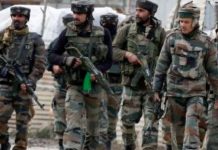
India’s story of partition will remain shrouded in the vaults of British Archives as British Home Office rejects British author Andrew Lownie’s plea seeking release of the personal diaries of the power couple, Lord Louis Mountbatten and Edwina
Initially, it was reluctance of the British Home Office, but finally came the refusal, when the appellate tribunal turned down the repeated pleas for the release of the crucial parts of the Mountbatten Diaries. These documents drawing worldwide attention of the researchers might have unravelled the truth of India’s partition, an avoidable human tragedy. The request for the release of the documents was declined that it might adversely affect the relationships among three countries, India, Pakistan and Britain. The petition was submitted on behalf of Andrew Lownie, a British author, seeking the release of the personal diaries of the power couple, Lord Louis Mountbatten and Edwina, who were the key players during the tumultuous period during 1946-47, when the transfer of power took place from Britain to India. For seeking the information, Lownie had coughed up a whopping sum of £370,000 (equivalent to Rs. 3,51,63,732.46) on legal fees.
Louis Mountbatten, the last Viceroy and Governor General of India, had arrived on the Indian shores accompanied by Edwina, a woman with her knock-out charm blended with a rare talent. Being an heiress inheriting a rich Jewish-German family background, she belonged to the upper crust of British society. Her grandfather Sir Ernest Cassel, a German-Jewish-born financier, had become best friends with King Edward VII, who was also Edwina’s godfather. Edwina was not one of the dumb vicereines of India, but a woman of substance.

Edwina had a large number of admirers across the continents, but in India her proximity with Pandit Jawaharlal Nehru, India’s first Prime Minister, a statesman and visionary, became a legend in their lifetime like a fairy tale expressed in their passionate 12-year correspondence. It could not have been just an infatuation towards Nehru, who was well-versed in the English etiquette, their relationship had political and strategic dimensions too. The confidential documents, perhaps, might have revealed how the trio, Louis, Edwina and Nehru cleverly played their respective roles during the country’s partition. Did they deliberately concede a Pakistan to Jinnah, a deformed country, carved out in the name of Islam? It was further fragmented, when in 1971 its majority population seceded to form Bangladesh.
The Initial British Plan
The scholars of the contemporary history of the Indian sub-continent are aware of the fact that the partition of India in 1947 was the outcome of a well thought out colonial design to fragment the country, if the British have ever to leave the sub-continent. The initial plan was to allow 500 native kingdoms to assume sovereignty, the north-eastern region, comprising present day Indian states of Meghalaya, Mizoram and Nagaland, to be converted into an independent dominion, ‘crown country’ and Muslim enclaves to be set up in different parts of the country having sovereign status. The British plan, however, remained on the paper. The colonial power had weakened so much during the post World War-II years that they were in no position to implement the fragmentation of India as conceived earlier.
There appears to be some substance in the tribunal’s claim that the release of the documents might adversely affect the relationships among the three countries, Britain, India and Pakistan. It should have also mentioned Bangladesh. The documents, if revealed, perhaps, might give the details about the respective roles of Louis and Edwina during the 1946-47. The inside story of their political acumen in manipulating India’s freedom struggle icons, Mahatma Gandhi, Jawaharlal Nehru and Sardar Vallabhbhai Patel, is still in wraps. It is also asked whether the British proxy, Muhammad Ali Jinnah, was led to accept a Pakistan having two wings, the East and the West separated with each other by a distance of 1500 kilometres. The majority population of Pakistan was in its eastern wing, which separated to become Bangladesh in 1971.
This possibility cannot be ruled out that the Mountbatten couple and Nehru had cleverly managed Jinnah to accept a truncated nation. The documents, perhaps, might have answered these questions. It is, however, quite known that Nehru’s proximity with Louis and Edwina was quite natural. Like them, Nehru, who studied in the top British schools, had become one of the most acceptable Indians in the higher echelons of the English society as well as he also enjoyed respect among the British intellectuals. He was also one of the founders of the London School of Economics. Similarly, Edwina’s frequent interactions with the war victims in hospitals and drawing the attention of the concerned authorities towards the plight of the sick and wounded had drawn her towards Nehru. They shared the pain of the war victims.
Jinnah Accomplishes Pakistan
It is stated that often truth is stranger than fiction. Jinnah might have agreed to the Cabinet Mission Plan, which could have preserved India’s unity. However, the behaviour of the Muslim League ministers in the interim government, perhaps, getting direct instructions from the British intelligence, finally paved the way for India’s partition. The Congress Party leaders were convinced that it was not possible to share power with them, and thus Pakistan was conceded. In a bid to resolve this standoff between the Indian National Congress and the Muslim League, Louis Mountbatten was sent to India for finding a solution acceptable to all the parties.
Interestingly, the British have also kept the truth about Jinnah under wraps that why a person, who could not recite even a stanza of Holy Koran, was projected as the sole Muslim leader of India and also became a darling of the British rulers. Another British proxy, Razakars (the earlier version of the present Islamists or Taliban during the colonial era), and their relationship with the Muslim League too needs a thorough investigation. Jinnah’s ‘Direct Action’ in Kolkata, which had led to the massive communal riots, could have been engineered with the help of the Razakars. Their relationship with Jinnah’s Muslim League too needs to be researched that how was it done at the cost of the innocent Muslims across India.
The Key Role of Mountbatten
Thus, the inside story of the power couple and their strategy in India’s partition might have also exposed that how they manipulated Jinnah to finally seek the partition of the country, thus turning Hindus and Muslims, who were living as peaceful neighbours for hundreds of years, against each other and becoming blood thirsty arch enemies of each other.
The British narrative is silent about the fact that Jinnah belatedly realized his Himalayan blunder, and might have tried to retrace from fragmenting his motherland. However, in this context, the role of Edwina needs to be studied whether she really charmed Jawaharlal Nehru to accept the outgoing colonial power’s agenda of India’s partition or the Mountbatten couple had finally entrapped a reluctant Mohammed Ali Jinnah to accept the country’s fragmentation on the basis of religion, who might have been satisfied with a number of autonomous Muslim enclaves within India. On her part, she prevailed upon Mountbatten that Andaman Islands should be given to India for keeping Nehru in good humour. Sardar Vallbhbhai Patel was assured that if partition is accepted, the full basket of the princely states will come to India. Even the boundary commission headed by Radcliff accepted Nehru’s suggestion that the Muslim enclave in the Punjab, Malerkotla, will remain in India, as there cannot be any Pakistan in the east of Sutlej.
It is highly unlikely that the reported romance between Jawaharlal Nehru and Edwina, could have been the only reason for the refusal of the tribunal in releasing the documents. In the statecraft money and romance could be just a comic relief in a political drama; they are often projected to camouflage the agenda. In this case too, it appears that the element of romance was a side story of the cruel game of the partition which resulted in killing of thousands of innocent people in India turning a large number of people refugees in their own country overnight.
Therefore, it is not surprising that the British Government is keen to keep the vital Mountbatten files away from the public gaze. The Mountbatten couple, perhaps, had played the role of a midwife that the twins, present day India and Pakistan, born out of a white mother. The outgoing imperial power’s, Parliament, the British House of Commons, had enacted the India Independence Act 1947 granting independence to its subjects in the Indian sub-continent.













